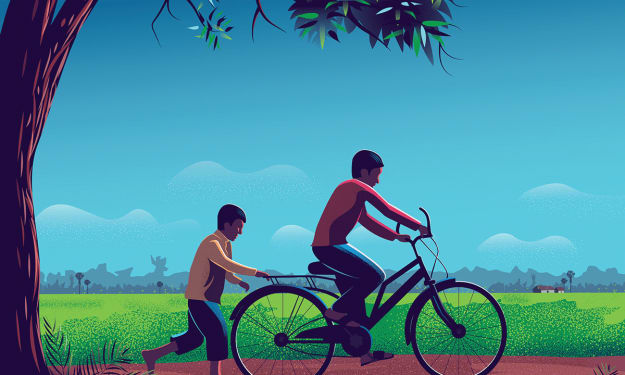India Has the Most Notable Pace of 'Zero-Food' Youngsters After Guinea and Mali, Uncovers Study.
India's ‘ zero- food ’ children smirch6.7 m kiddies have nothing to eat for entire day

The concentration on assessing the commonality of zero-food kids—where they haven't devoured anything by any means in a 24-hour period—in India is 19.3%. The figures are a lot lower in Bangladesh (5.6%), Pakistan (9.2%), the DR Congo (7.4%), Nigeria (8.8%), and Ethiopia (14.8%).
New Delhi: India's commonality of "zero-food" kids—where they haven't devoured anything by any stretch of the imagination in a 24-hour range—is tantamount to the rates in the west African countries of Guinea, Benin, Liberia, and Mali, the message detailed, referring to a review that pre-owned information from the Association wellbeing service's Public Family Wellbeing Overview for 2019-2021.
The review assessed India's commonality of zero-food kids at 19.3%, the third most elevated after Guinea's 21.8% and Mali's 20.5%.
The figures are a lot lower in Bangladesh (5.6%), Pakistan (9.2%), the DR Congo (7.4%), Nigeria (8.8%), and Ethiopia (14.8%).
The review was directed at utilizing wellbeing studies across 92 low- and middle-income nations at different times, somewhere in the range of 2010 and 2021.
Absence of taking care of babies
Wellbeing specialists acquainted with kid sustenance issues in India told the Message that the hardship of food prompting zero-food youngsters is probably going to reflect not an absence of admittance to food but rather the failure of many moms to give proper care to their newborn children.
Zero-food youngsters are newborn children or babies matured between a half year and two years who have not gotten any milk or strong or semisolid food within a 24-hour time frame. Across the 92 nations, more than the vast majority of the zero-food youngsters had been breastfed, showing that practically every one of the kids had gotten a few calories in any event during the 24-hour time frame during which they had been denied food. Be that as it may, at a half year, breastfeeding is as of now not adequate to furnish youngsters with the sustenance they require, said the report.
Youngsters then, at that point, need sufficient protein, energy, nutrients, and minerals through extra food and breastfeeding. "The numbers feature... the dire requirement for fitted mediations to resolve this issue," Subramanian and his partners said in their paper. They said that more exploration was expected to disentangle "the fundamental causes" of zero-food pervasiveness, the boundaries to ideal satisfactory youngster taking care of practices, and the manners in which financial variables could impact kid taking care of conduct.
Vandana Prasad, a pediatrician and general wellbeing expert who was not related to the review, told the day-to-day that numerous babies are denied reciprocal care on the grounds that their moms' conditions keep them from giving the youngsters care.
"It isn't difficult to take care of kids who are a half year old; it requires investment, and a significant number of the ladies in families where zero-food youngsters could have been found don't have the help they expect for sufficient corresponding taking care of," Prasad said.
In monetarily distraught families, whether in country districts or metropolitan ghettos, moms frequently wind up adjusting liabilities to procure wages and run family errands. This leaves them with a deficient opportunity to commit to reciprocal care for their kids.
Maternity privileges and childcare administrations could assist with resolving the issue, yet numerous ladies don't approach such administrations, said Prasad, who's likewise a specialized counsel to the General Wellbeing Asset Organization, a non-government office that has appeared through examinations in Odisha on how crèches can assist with lessening under-nourishment levels in kids from weak families. Social issues and the absence of data may, in certain cases, influence corresponding taking care of practices, she said.
Discoveries from the past review
Subramanian and his associates had last year created India's most memorable gauge of the predominance of zero-food youngsters in view of the 2019–2021 wellbeing overview information. The review uncovered that almost two out of every 10 babies or little children in India face the gamble of not getting any food at all for an entire day, as the message had detailed.
What's more, this uncovered essentially no adjustment of this proportion of food hardship beginning around 2016, it said. The level of "zero-food" youngsters expanded from 17.2% in 2016 to 17.8% in 2021. The tested kids wematurered between a half-year and 23 months and hadn't eaten any food with significant calorific substance for essentially a whole day.
" The information contained commodity strange and surprising — we do not anticipate small kiddies between a partial time and 23 months to go fully unfed for an entire 24 hours," Subramaniad told the Daily." We do not have the foggiest idea how long the difficulty endured in every youth test — that is a restriction in the information.
In any case, we'd anticipate that a kid should get some food over an entire day," Subramanian said. "The nonattendance signals extreme food hardship." This study tested more than 600,000 families and included questions that examined what food children aged six to 23 months had devoured over the past 24 hours. Both the 2016 and 2021 studies had numerous indistinguishable inquiries as to whether the kid had polished off one of the different strong or fluid food sources.
A response of "no" to all the food inquiries for a youngster implied the kid got no food in the previous 24 hours. As per the report, the examination has yielded an expected headcount of 5.9 million zero-food youngsters in the six- to 23-month-old age group in India in 2021.
Uttar Pradesh had the most noteworthy predominance (27.4%) of zero-food youngsters, trailed by Chhattisgarh (24.6%), Jharkhand (21%), Rajasthan (19.8%), and Assam (19.4%). Bengal is one of around 20 states where the predominance of zero-food youngsters has diminished since around 2016. In Bengal explicitly, the extent dropped from 12.1% in 2016 to 7.5% in 2021, the report said. Goa had the most significance, ranging from 18.9% to 5.1%, it added.





Comments
There are no comments for this story
Be the first to respond and start the conversation.